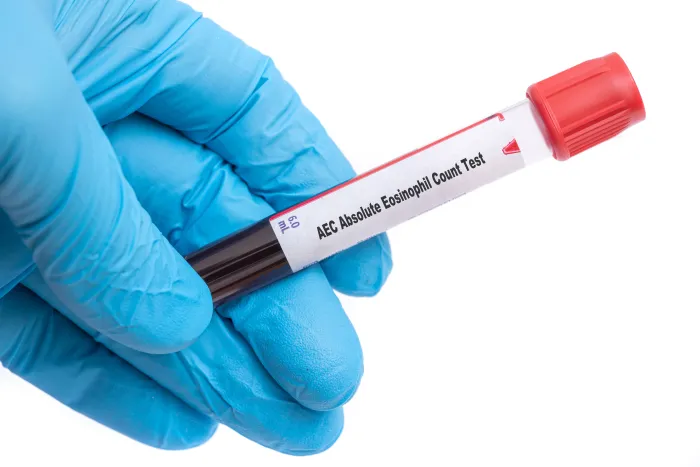Eosinophil Count Test and Normal Range Explained
Understand the Eosinophil Count test, its purpose, and what the normal range indicates. Learn how this test helps detect allergic reactions, infections, and certain medical conditions.

Written by Dr. Rohinipriyanka Pondugula
Reviewed by Dr. Shaik Abdul Kalam MD (Physician)
Last updated on 12th Aug, 2025

If you’ve recently had a blood test and heard the term "eosinophil count," you might be wondering what it means. Don’t worry, this guide will help you understand everything about eosinophils, why their levels matter, and what you can do if your count is too high or too low.
What Are Eosinophils?
Eosinophils are a type of white blood cell that play a crucial role in your immune system. They help fight infections, especially those caused by parasites, and are also involved in allergic reactions and inflammation.
A eosinophil count test measures how many of these cells are present in your blood. This test is often part of a Complete Blood Count (CBC) or may be ordered separately if your doctor suspects an allergy, infection, or autoimmune condition.
Consult a Top Immunologist
Why Is the Eosinophil Count Test Done?
Your doctor may recommend this test if you have symptoms like:
- Frequent allergies (rashes, sneezing, asthma)
- Chronic infections (especially parasitic infections)
- Autoimmune diseases (like lupus or rheumatoid arthritis)
- Skin conditions (eczema, dermatitis)
- Unexplained weight loss or fatigue
What Is the Normal Range for Eosinophils?
Eosinophils usually make up a small percentage of your total white blood cells. The normal range is:
- Absolute eosinophil count (AEC): 30 to 350 cells per microliter (µL) of blood
- Percentage in a CBC: 1% to 6% of total white blood cells
- What Does a High Eosinophil Count Mean? (Eosinophilia)
If your eosinophil count is above 500 cells/µL, it’s called eosinophilia. Possible causes include:
- Allergies (asthma, hay fever, food allergies)
- Parasitic infections (worms, malaria)
- Autoimmune diseases (lupus, Crohn’s disease)
- Certain cancers (leukemia, lymphoma)
- Skin disorders (eczema, psoriasis)
What Does a Low Eosinophil Count Mean? (Eosinopenia)
A count below 30 cells/µL is considered low. This can happen due to:
- Severe infections or stress
- Use of steroid medications
- Cushing’s syndrome (high cortisol levels)
How to Manage Abnormal Eosinophil Levels?
If your test shows high or low eosinophil counts, your doctor will investigate further. Here’s what you can do:
For High Eosinophil Count (Eosinophilia):
- Identify and treat allergies (avoid triggers, take antihistamines)
- Get tested for infections (especially parasites)
- Follow an anti-inflammatory diet (reduce processed foods, sugar)
- Manage asthma or eczema with prescribed medications
For Low Eosinophil Count (Eosinopenia):
- Check for infections and treat them if needed
- Review medications (steroids may lower eosinophils)
- Boost immunity with a balanced diet (vitamin C, zinc, probiotics)
Get Your Health Assessed
When to See a Doctor?
If you experience:
- Severe allergic reactions (swelling, difficulty breathing)
- Persistent infections (fever, fatigue, weight loss)
- Unexplained rashes or breathing problems
- It’s best to consult a doctor for further tests.
How to Book a Test or Consultation?
If you need an eosinophil count test or want to discuss your symptoms with a specialist, you can easily book a test or doctor consultation through Apollo 24|7.
Steps to Book:
1. Visit Apollo 24|7 website/app
2. Select "Lab Tests" or "Consult a Doctor"
3. Choose "Eosinophil Count Test" or speak to a specialist
4. Schedule a home sample collection or online consultation
Getting tested is simple, quick, and helps in early detection and treatment.
Final Thoughts
Eosinophils are important for your immune system, and abnormal levels can indicate underlying health issues. If your test results are outside the normal range, don’t panic work with your doctor to find the cause and take the right steps for better health.
Consult a Top Immunologist
Consult a Top Immunologist

Dr Bharath Kumar S
Paediatrician
5 Years • MBBS MD
Bengaluru
PRESTIGE SHANTHINIKETAN - SOCIETY CLINIC, Bengaluru

Dr. Anshu Sethi
Paediatrician
33 Years • MBBS, MD, DM (Paediatrics & Neonatology)
Pune
Apollo Clinic, Viman Nagar, Pune
(75+ Patients)

Dr. Shalini Devireddy
neonatologist
8 Years • MBBS,MD(Paediatrics)
Manikonda Jagir
Apollo Clinic, Manikonda, Manikonda Jagir

Dr. Rohit Vohra
Paediatric Pulmonologist
10 Years • MBBS, MD PEDIATRICS, FELLOWSHIP IN PEDIATRIC INTENSIVE CARE,FELLOWSHIP IN PULMONOLOGY
Delhi
Apollo Hospitals Indraprastha, Delhi
(75+ Patients)

Dr Yaja Jebaying
Paediatric Gastroenterologist
9 Years • MBBS, MD PEDIATRICS, FELLOWSHIP PEDIATRIC GASTROENTEROLOGY AND HEPATOLOGY AND LIVER TRANSPLANTATION
Delhi
Apollo Hospitals Indraprastha, Delhi
(25+ Patients)
Consult a Top Immunologist

Dr Bharath Kumar S
Paediatrician
5 Years • MBBS MD
Bengaluru
PRESTIGE SHANTHINIKETAN - SOCIETY CLINIC, Bengaluru

Dr. Anshu Sethi
Paediatrician
33 Years • MBBS, MD, DM (Paediatrics & Neonatology)
Pune
Apollo Clinic, Viman Nagar, Pune
(75+ Patients)

Dr. Shalini Devireddy
neonatologist
8 Years • MBBS,MD(Paediatrics)
Manikonda Jagir
Apollo Clinic, Manikonda, Manikonda Jagir

Dr. Rohit Vohra
Paediatric Pulmonologist
10 Years • MBBS, MD PEDIATRICS, FELLOWSHIP IN PEDIATRIC INTENSIVE CARE,FELLOWSHIP IN PULMONOLOGY
Delhi
Apollo Hospitals Indraprastha, Delhi
(75+ Patients)

Dr Yaja Jebaying
Paediatric Gastroenterologist
9 Years • MBBS, MD PEDIATRICS, FELLOWSHIP PEDIATRIC GASTROENTEROLOGY AND HEPATOLOGY AND LIVER TRANSPLANTATION
Delhi
Apollo Hospitals Indraprastha, Delhi
(25+ Patients)
